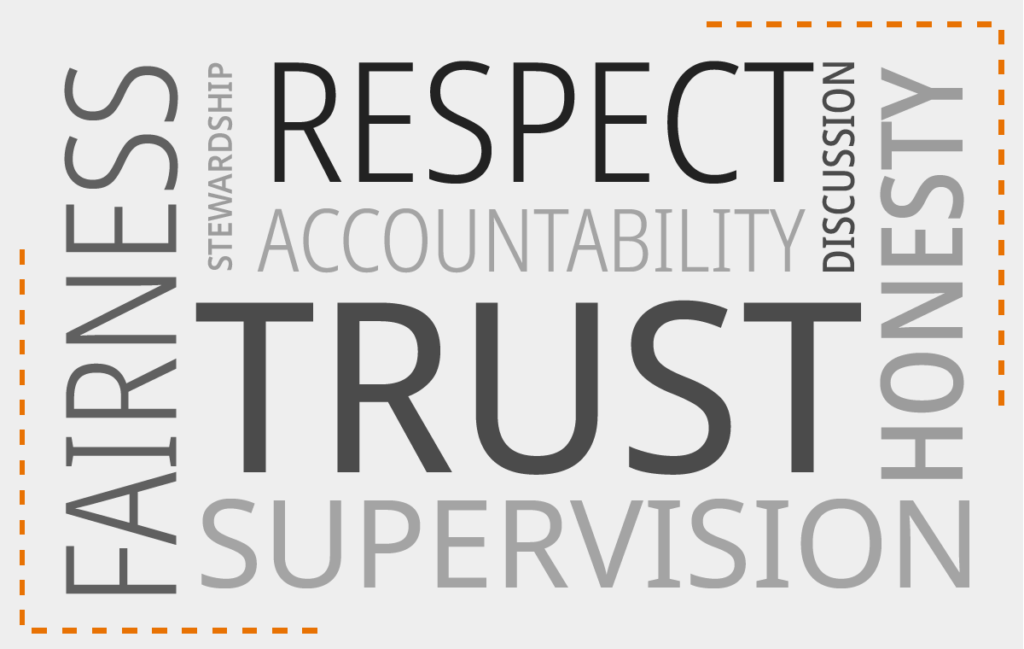Integrity is an important quality that is highly valued in both personal and professional settings. It refers to the adherence to moral and ethical principles, being honest, and doing the right ting even when no one is watching. In the workplace, integrity is essential for building trust, maintaining a positive reputation, and fostering a healthy work environment. In this blog post, we will explore some key examples of integrity in the workplace.
One of the most important examples of integrity is honesty. This means telling the truth, being open, and not taking advantage of others. Honesty is essential for building trust and credibility with colleagues, clients, and customers. It involves being transparent about your intentions, actions, and decisions, and taking responsibility for your mistakes.
Respect is another key aspect of integrity. It involves treating others with dignity, empathy, and understanding, even in difficult situations. This means listening to others’ perspectives, being open to feedback, and valuing diversity and inclusivity in the workplace.
Generating trust is also a crucial example of integrity. Trust is built through consistent actions and behaviors that demonstrate reliability, competence, and ethical conduct. This involves keeping confidences, honoring commitments, and following through on promises. Trust is essential for fostering positive relationships with coworkers, clients, and customers, and for achieving organizational goals.
Pride is another vital aspect of integrity. It involves taking pride in your work, and striving for excellence in all that you do. This means being diligent, proactive, and always seeking ways to improve your performance. Pride also involves taking ownership of your work, and being accountable for your actions and decisions.
Responsibility is also a key example of workplace integrity. This means being accountable for your actions, and taking responsibility for your mistakes. It involves admitting when you are wrong, and working to correct your mistakes. Responsibility also involves being proactive and taking initiative to address issues and problems, rather than waiting for someone else to do it.
Keeping promises is another essential aspect of integrity. This means honoring commitments, and following through on promises. It involves being reliable, and doing what you say you will do, when you say you will do it. Keeping promises is essential for building trust and credibility with others, and for fostering positive relationships in the workplace.
Helping others is a vital example of integrity. This involves being supportive, compassionate, and empathetic towards others. It means being willing to lend a hand, offer guidance, and provide support to colleagues, clients, and customers. Helping others is essential for building positive relationships in the workplace, and for creating a supportive and collaborative work environment.
Integrity is an essential quality for success in the workplace. It involves a combination of honesty, respect, trust, pride, responsibility, keeping promises, and helping others. By embodying these values, individuals can build strong relationships with coworkers, clients, and customers, and contribute to a healthy and positive work environment.
Characteristics of Integrity
Integrity is a fundamental quality that descrbes a person’s commitment to doing what’s right, even when no one else is looking. There are several characteristics that define integrity, but five of the most important ones are:
1. Honesty: Being truthful and transparent is a key aspect of integrity. People with integrity don’t lie, cheat, or deceive others, and they are willing to speak up and admit their mistakes.
2. Respect: Treating others with respect, dignity, and fairness is another hallmark of integrity. People with integrity recognize that everyone deserves to be treated with kindness and consideration, regardless of their background, beliefs, or status.
3. Trustworthiness: Building trust is essential to maintaining integrity. People with integrity are reliable, dependable, and consistent in their actions, and they follow through on their commitments.
4. Responsibility: Taking responsibility for one’s actions and decisions is a crucial aspect of integrity. People with integrity don’t blame others or make excuses for their mistakes, but instead, they own up to their choices and work to make things right.
5. Helping others: people with integrity are often driven by a desire to help others. They are compassionate, empathetic, and willing to lend a hand to those in need, even if it means sacrificing their own time or resources.

Examples of Integrity in the Workplace
Integrity is an essential trait that every employee should possess in the workplace. It is the quality of being honest, trustworthy, and ethical in all your actions and decisions. Some examples of integrity in the workplace include putting in the hours to get the job done, dealing with conflict in a proper manner, reporting unethical behavior, being upfront abut your shortcomings, being willing to do hard work, taking accountability for your actions, being a team player, and respecting others.
Putting in the hours means that you are willing to work hard and put in the necessary effort to achieve your goals. This shows that you are committed to your work and are willing to go the extra mile to get things done.
Dealing with conflict properly means that you are able to resolve conflicts in a peaceful and diplomatic manner. This shows that you are a good communicator and can work well with others.
Reporting unethical behavior means that you have the courage to speak up when you see something wrong happening in the workplace. This shows that you have strong moral values and are willing to do what is right even when it is difficult.
Being upfront about your shortcomings means that you are honest about your weaknesses and are willing to work on improving them. This shows that you are self-aware and willing to take constructive feedback.
Being willing to do hard work means that you are not afraid of challenges and are willing to put in the effort to overcome them. This shows that you are determined and focused on achieving your goals.
Taking accountability for your actions means that you are willing to accept responsibility for your mistakes and learn from them. This shows that you are reliable and trustworthy.
Being a team player means that you are able to work well with others and contribute to the success of the team. This shows that you are collaborative and supportive of others.
Respecting others means that you treat everyone with dignity and respect, regardless of their position or background. This shows that you are empathetic and considerate towards others. integrity is a crucial aspect of workplace culture, and employees who exhibit it are highly valued for their honesty, ethics, and professionalism.
Demonstrating Integrity at Work
Integrity at work is demonstrated through a combination of behaviors that reflect honesty, transparency, and accountability. To show integrity in the workplace, one must consistently adhere to ethical principles and values, maintain confidentiality when required, and follow through on commitments.
One way to demonstrate integrity is to be honest in all interactions with colleagues, superiors, and clients. This means beig truthful when providing information, admitting when you do not know something, and avoiding exaggerations or misrepresentations. Additionally, it involves being transparent about your intentions, motives, and goals.
Another important aspect of integrity is maintaining confidentiality when dealing with sensitive information. This involves respecting the privacy of colleagues and clients, not sharing confidential information without permission, and protecting confidential data from unauthorized access.
Integrity also means being accountable for your actions and taking responsibility for your mistakes. If you make a mistake, own up to it, and work to rectify the situation. Doing so demonstrates that you are honest and open to constructive feedback.
Showing integrity in the workplace involves a combination of honest communication, respect for confidentiality, and accountability. By consistently demonstrating these behaviors, you can build a reputation for trustworthiness and establish yourself as a valuable and reliable member of the team.
Integrity in School: An Example
A good example of integrity in school is when a student resists the temptation to cheat on a test or assignment. This means that the student is committed to maintaining academic honesty, even when it may be difficult or tempting to take shortcuts. Another example of integrity is when a student takes responsibility for their mistakes and owns up to their actions. This includes admitting to plagiarism or academic misconduct, and seeking appropriate consequences to remedy the situation. Additionally, maintaining confidentiality and respecting the intellectual property of others, such as not sharing class materials or instructor’s intellectual property wihout permission, demonstrates a high level of integrity in school. integrity in school involves upholding moral and ethical values, demonstrating honesty, and taking responsibility for one’s actions.
Ten Traits of a Person With Integrity
A person with integrity can be recognized by several traits that shape their character and behavior. Here are ten such traits:
1. Honesty: Integrity is closely tied to honesty. A person with integrity always tells the truth, even when it is difficult or uncomfortable.
2. Trustworthiness: A person with integrity is trustworthy. They keep their promises and are reliable in their commitments.
3. Authenticity: An authentic person is true to theselves and their values. They do not pretend to be someone they are not or hide their true intentions.
4. Respectful: A person with integrity shows respect for others. They treat everyone with dignity and kindness, regardless of their position or background.
5. Responsibility: A person with integrity takes responsibility for their actions and decisions. They do not blame others or make excuses for their mistakes.
6. Fairness: A person with integrity is fair and just in their dealings with others. They do not show favoritism or bias.
7. Compassion: A person with integrity has empathy and compassion for others. They are sensitive to the needs and feelings of others and are willing to help when they can.
8. Humility: A person with integrity is humble. They do not seek recognition or praise for their actions but are content to do what is right.
9. Courage: A person with integrity has courage. They stand up for what they believe in, even when it is not popular or easy.
10. Consistency: A person with integrity is consistent in their behavior and values. They do not change their principles based on circumstances or pressure from others.

The Meaning of Integrity and an Example
Integrity is a characteristic of a person who is committed to following moral and ethical principles. It refers to the consistency between a person’s actions, beliefs, and values. An individual with integrity behaves honestly and responsibly, even when no one is watching.
For example, a person with integrity would keep their promises, no matter how difficult it may be to fulfill them. They would take personal responsibility for their actions and admit their mistakes. Such an individual would also treat others with respect, regardless of differences in opinion or background. They would follow the rules, not just becuse they were set, but because they believe in the importance of upholding moral standards. integrity is a crucial trait that helps individuals build trust, credibility, and respect in personal and professional relationships.
The Importance of Professional Integrity
Professional integrity is the adherence to a set of moral and ethical principles, values and behaviors that are expected in the workplace. There are several elements that define professional integrity, but three of the most important ones are honesty, respectfulness, and accountability.
Honesty is the foundation of professional integrity. It means being truthful and transparent in all your actions and communications, and avoiding deceitful or misleading behaviors. Honesty also involves admitting your mistakes and taking responsibility for them, rather than trying to cover them up or blame others.
Respectfulness is another key element of professional integrity. It means treating others with dignity, courtesy, and consideration, regardless of their position, background, or opinions. Respectfulness also involves listening actively, communicating clearly, and avoiding offensive or discriminatory language or behavior.
Accountability is the third essential element of professional integrity. It means taking responsibility for your actions and decisions, and being willing to accept the consequences of your choices. Accountability also involves following through on your commitments, meeting your obligations, and avoiding excuses or blame-shifting.
Professional integrity is a set of values and behaviors that define how individuals should conduct temselves in the workplace. Honesty, respectfulness, and accountability are three key elements of professional integrity that are essential for building trust, credibility, and success in any professional setting.
Types of Integrity
Data Integrity is the assurance that data is accurate, consistent, and reliable troughout its lifecycle. It is a critical concept in database management systems. There are four main types of Data Integrity: Domain Integrity, Entity Integrity, Referential Integrity, and User-Defined Integrity.
1. Domain Integrity: This type of integrity ensures that the data entered into a specific field or column of a database table follows a predefined set of rules or constraints. For example, a database may have a domain integrity rule that specifies that a particular field must always contain a valid date.
2. Entity Integrity: This type of integrity ensures that each row of data in a table is unique and can be uniquely identified. It requires the existence of a primary key column in the table. A primary key column is a unique identifier for each row of data in a table.
3. Referential Integrity: This type of integrity ensures that relationships between tables are maintained correctly. It requires that foreign keys in one table match the primary key in another table. Referential Integrity ensures that data is not lost when related rows are deleted or updated in one or more tables.
4. User-Defined Integrity: This type of integrity allows users to define and enforce their own rules or constraints on the data in a database. For example, a user-defined integrity rule may specify that a particular field must always contain a specific value or a range of values.
Understanding and managing Data Integrity is crucial for ensuring the quality of data in a database. The four types of Data Integrity ensure that data is accurate, consistent, and reliable throughout its lifecycle.
The Six Values of Integrity
The six values of academic integrity are honesty, trust, fairness, respect, responsibility, and courage. Honesty refers to being truthful and transparent in one’s actions, thoughts, and speech. Trust involves building a relationship of reliance and confidence with oters through one’s actions and words. Fairness refers to treating everyone equally, without any bias or prejudice. Respect involves treating oneself and others with dignity, kindness, and consideration. Responsibility involves taking ownership of one’s actions and being accountable for them. Lastly, courage involves having the strength to stand up for what is right, even in the face of adversity. These six values of academic integrity are essential for fostering a culture of honesty and accountability in all aspects of our teaching, learning, and professional experiences.

Answering Integrity Interview Questions
When answering integrity interview questions, it is important to be honest and transparent. Employers are looking for candidates who have a strong sense of personal and professional ethics, and who can maintain those values even in challenging situations.
To begin, it is important to define what integrity means to you. Take some time to reflect on your personal values and the principles that guide your decision-making. Consider how you have demonstrated integrity in the past, whether through your actions at work, your interactions with colleagues and clients, or your personal relationships.
When answering an integrity question, start by providing a clear and concise definition of what integrity means to you. From there, provide specific examples of times when you have demonstrated integrity in your work or personal life. Be sure to emphasize the actions you took to uphold your values, and the outcome of those actions.
It is also important to acknowledge that maintaining integrity can sometimes be challenging. Discuss any difficult situations you have faced, and how you navigated those situations while staying true to your values.
Be sure to emphasize your commitment to maintaining integrity in all areas of your life. Let the interviewer know that you understand the importance of ethical behavior in the workplace, and that you are committed to upholding those values if hired for the position.
Demonstrating Integrity to Others
Showing someone who has integrity can be done in a variety of ways. Firstly, individuals with integrity often take responsibility for their actions and own up to their mistakes. They will not make excuses or shift blame onto others. Secondly, individuals with integrity put the needs of others aboe their own. This can include offering to help others in need, being kind and considerate, and showing empathy towards others. Thirdly, individuals with integrity are often generous with giving others the benefit of the doubt. They do not jump to conclusions or make assumptions without first seeking all the facts. Fourthly, individuals with integrity choose honesty in all things. They do not lie, cheat, or manipulate others for their own personal gain. Fifthly, individuals with integrity show respect to everyone, regardless of their background or status. They treat others with kindness and dignity. Sixthly, individuals with integrity manifest humility. They are not arrogant or boastful, but rather possess a sense of humility and modesty. Lastly, individuals with integrity are able to admit when they are wrong. They are not afraid to apologize or make amends when they have made a mistake. showing someone who has integrity involves observing their actions, attitudes, and behaviors towards themselves and others.
Demonstrating Integrity
Integrity is a quality that is highly valued in personal and professional settings. When referring to someone who possesses integrity, one could say that they are a person of integrity or have integrity. Additionally, you could describe their actions or behavior as being honest, ethical, trustworthy, and principled. These characteristics are often associated with individuals who have integrity. Other phrases that could be used to describe someone with integrity include having a strong moral compass, being reliable, and having a sense of honor. someone who has integrity is seen as a person who consistently acts in accordance with their values and beliefs, and is respected for their honesty and ethical behavior.
The True Meaning of Integrity
Integrity refers to the quality of being honest and having strong moral principles. It is the adherence to a set of ethical values, regardless of the situation or circumstances. At its core, integrity involves doing the right thing, even when no one is watching. It is about being truthful, reliable, and consistent in one’s actions and words.
Integrity is an essential trait in personal and professional relationships, as it builds trust and respect. It involves being accountable for one’s actions and taking responsibility for any mistakes or missteps. Integrity also encompasses transparency and openness, as individuals with integrity are open and honest in their dealings with others.
Furthermore, integrity involves treating oters with fairness and respect, regardless of their status or position. It is about upholding the dignity and rights of all individuals and being sensitive to their needs and concerns.
Integrity is an essential trait that involves honesty, strong moral principles, accountability, transparency, and fairness. It is a vital aspect of personal and professional relationships and builds trust and respect among individuals.

The Meaning of Integrity
Integrity is a personal trait that refers to the quality of being honest, fair, and consistent in one’s actions and decisions. It involves being true to oneself and others, following through on commitments, and maintaining a strong moral compass. An individual with integrity is someone who is trustworthy, dependable, and stands by their principles even when it’s difficult or inconvenient. They are transparent in their actions and words, and they do not compromise their values for personal gain or to please others. integrity is an essential component of character, and it is highly valued in personal and professional relationships.
The Three Key Elements of Integrity
Integrity is a multifaceted concept that encompasses several key elements, including incorruptibility, completeness, and communication. Incorruptibility refers to an individual’s unwavering commitment to ethical principles and moral values, even in the face of temptation or pressure to compromise those principles. It involves steadfast adherence to honesty, transparency, and accountability, and a refusal to engage in any form of dishonest or unethical behavior.
Completeness is anther essential aspect of integrity, and it refers to an individual’s commitment to being whole and consistent in their actions and words. This means that they are responsible and dependable, and they follow through on their promises and commitments. They are also thorough and meticulous in their work, ensuring that every detail is attended to and nothing is left incomplete or overlooked.
Communication is a crucial component of integrity, as it involves being open and transparent in all interactions and relationships. This means that individuals with integrity are honest and forthright in their communication, and they are willing to share their thoughts, feelings, and opinions openly and respectfully. They also listen actively to others and seek to understand their perspectives, even if they disagree.
These three key elements of integrity – incorruptibility, completeness, and communication – are essential for building trust, fostering positive relationships, and maintaining a strong sense of personal and professional ethics.
Conclusion
Integrity is an essential trait that can make or break an individual’s reputation, both personally and professionally. It involves honesty, respect, generating trust, taking responsibility, and keeping promises, among other things. In the workplace, examples of integrity include putting in the necessary hours, dealing with conflict properly, reporting unethical behavior, being upfront about one’s shortcomings, taking accountability for one’s actions, being a team player, and repecting others. Additionally, academic integrity involves being accountable for one’s mistakes, citing the work of others accurately, and keeping academic materials and instructor’s intellectual property private. By embodying integrity in all aspects of our lives, we can earn the trust and respect of others, build strong relationships, and achieve success in our endeavors.
